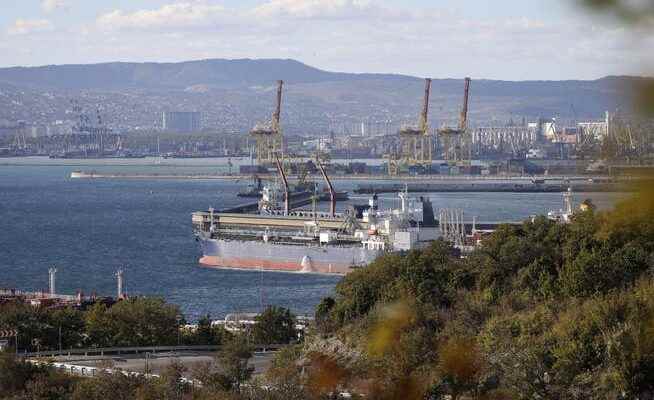The EU embargo could trigger violent price movements. The sanctions remain an experiment. Especially since the West hopes that its own measures will not be too effective.
It is becoming more difficult for Russia to sell oil that is loaded onto ships here in Novorossiysk.
The big price jump for oil on Monday morning did not materialize. After months of bickering, a price cap for Russian crude oil was finally put in place in the EU with some fanfare, which will apply from December 5th. The EU countries and Great Britain now only allow their companies to insure and finance shipping of Russian oil for third countries if the oil is sold at a price of no more than 60 dollars per barrel.
Oil and gas are different
In the midst of all the discussion about the price cap, it was forgotten that this is also the starting signal for what is currently the most ambitious reaction by Western states to the Russian war of aggression in the energy sector. Before February 24, the EU’s share of Russian oil exports was around 50 percent. Crude oil is now no longer allowed to be imported from Russia by sea. Transport by pipeline is still permitted, although Germany and Poland also prohibit this. From February 5, the ban will also apply to petroleum products such as petrol.
Even if it doesn’t seem so, the EU has not yet imposed any serious sanctions on Russian energy exports. When it comes to natural gas, Moscow itself has turned off the tap. When it comes to crude oil, it is now Brussels. This different approach can be explained: Europe is less dependent on Russia for oil because it can be transported more easily than gas and because there are a large number of suppliers. This makes sanctions “cheaper” for Europe. With natural gas, on the other hand, Moscow has greater leverage than with oil, which is why gas is more suitable for Russia as an energy weapon.
With a long start-up time
And the price cap is not quite what it first appears to be. The goal is to maintain Russian oil supplies to countries like China, India or Indonesia while reducing oil revenues for Russia. The EU’s original plan was to ban insurance and financing services altogether. The price cap would then have been around $0. In any case, the current upper limit of $60 per barrel corresponds to the price of Russian crude oil, which is traded at a discount to the world market price.
Nevertheless, the step can be described as a historic intervention, which in the long term is also about controlling the oil market. The biggest risk for the oil price is that Moscow will cut exports as a tit-for-tat, which would send prices sharply higher. Above all, Russia would have an incentive to do so if the sanctions actually took effect.
In addition, the embargo was announced long enough for Russia to prepare for it. Companies from the EU and the UK currently dominate the market for insurance and other shipping services. That’s why a total ban would be so drastic. However, Iran and Venezuela are showing how sanctions can be dealt with. Russia is said to have already bought up old tankers and is offering domestic insurance. Because of the huge amounts that would have to be diverted, the effect is still unclear.
Price reduction is cemented
The other petrostates also take little pleasure in interventions by the consumer states: If someone here is manipulating the oil market, then it’s us, one might think in the Middle East. In the long term, however, the oil countries could increasingly decouple themselves from the Western infrastructure for oil trading, similar to what is happening in the financial sector due to sanctions. Experience so far this year has shown that the global energy markets are extremely adaptable: this helps Europe with gas, but not with oil.
Two points speak in favor of the embargo and the price cap: Firstly, the transport of Russian oil will become more expensive and the price reduction will be further cemented as a result. Secondly, it builds up a bargaining chip with Moscow. However, the longer the sanctions last, the more likely it is that they will be circumvented. The measures remain an experiment, they are certainly not a panacea.
You can contact business editor Gerald Hosp follow on twitter.
